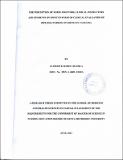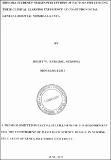THE INFLUENCE OF CLINICAL NURSE INSTRUCTOR PRACTICES ON CLINICAL PERFORMANCE AMONG BACHELOR OF SCIENCE IN NURSING (BSCN) STUDENTS IN KENYA

View/
Date
2020Author
Nthule Kavili, Julian
Kasusu Mutinda, Agnes
Kithinji, Winnie
Type
ArticleLanguage
enMetadata
Show full item recordAbstract
Purpose: The study sought to assess the influence of clinical nurse instructor practices on clinical
performance among BScN students in Kenya. It examined the influence of clinical instruction strategies
and clinical assessment tools on students’ clinical performance.
Methodology: This was a descriptive cross- sectional survey design. The total population of BScN
students (direct entry) in the sampled universities was one hundred and eighty four (184). Study sample
for students was obtained using Krejcie & Morgan table (1970). Study sample consisted of 160 third year
BScN students and 10 clinical nurse instructors from five selected universities in Kenya. Data collection
done using structured interview guide and self- administered questionnaires. Nursing students filled the
questionnaire, nurse instructors were interviewed. Data was analyzed using descriptive and inferential
statistics. Chi- square test, multiple regression and correlation models were used to test association and
relationships significance of the variables at 95% confidence level. Findings presented in tables and
figures.
Findings: The findings of the study revealed 149 (93.1%) students experienced demonstration strategy,
44 (27%) experienced Problem- solving strategy, 57 (35.6%) clinical conferencing and 38 (23.7%)
experienced clinical portfolios in clinical placements. Qualitative data findings revealed 10 (100%) Nurse
instructors applied demonstration strategy, 8 (80%) clinical conferencing, 3 (30%) problem- solving and 2
(20%) clinical portfolios in clinical teaching. Therefore demonstration was the most preferred clinical
teaching strategy in Kenyan universities with 95% response rate. Pertaining clinical assessment tools,
quantitative data results showed 131 (84%) agreed tools measured clinical competencies (knowledge,
Attitude & Practical skills) while qualitative findings showed only 4 (40%) instructors agreed tools
measured competencies (KAP). Nursing procedure manual and student training file required review. ChiSquare test findings revealed Students who did not experience problem- based strategy obtained higher
scores compared to those who had problem- based learning. This was statistically significant (χ²=8.618,
df=1, p=0.003). Multiple regression model findings showed clinical conferencing, institution, and clinical
portfolios statistically significantly predicted student clinical assessment scores (P=0.001, p=0.007, p=
0.030) respectively. Correlation analysis showed positive relationship between independent and
dependent variables, F (11, 46) =4.261, p< 0.001.
Unique contribution to theory, practice and policy: Experiential theory by David Kolb was used in the
study, found applicable and it is recommended for future nursing studies. Author recommends use of
clinical conferencing, problem based strategy and portfolios in clinical training of BScN students. Nurse
instructors require update on use of conferencing and portfolios in clinical teaching. Evaluation of BScN
clinical learning and assessment tools
Publisher
Journal of Health, Medicine and Nursing(JHMN)
Subject
BScN students, Clinical teaching strategies, Clinical assessment tools, clinical performanceCollections
Related items
Showing items related by title, author, creator and subject.
-
The Perception of Nurse Educators, Clinical Instructors and Students on Effectiveness of Clinical Evaluation of Diploma Nursing Students in Tanzania
Elmerick, Simon Chamila (KeMU, 2014-06)In the clinical practice settings, nurse educators facilitate students' learning practice and conduct clinical evaluation as part of students' training. The process of clinical evaluation involves nurse educators, clinical ... -
The Impact of Clinical Nurse Instructor’s Practices on Clinical Performance among Bachelor of Science in Nursing Students in Kenya
Kavili, Julian Nthule (KeMU, 2020-11)Clinical teaching is a major component of nursing education. The training of Bachelor of Science Nursing (BScN) students entails clinical nurse instructors to help students translate theoretical knowledge into clinical ... -
Diploma students' nurses’ perceptions of factors influencing their clinical learning experience at coast provincial general hospital Mombasa-Kenya
Ireri, Juliet W. (KeMU, 2015-06)Globally clinical expertise is the knowledge and skills of the health care professional. The clinical expertise of the nurse depends on educational preparation, current knowledge and research. Nurse training has a theory ...


